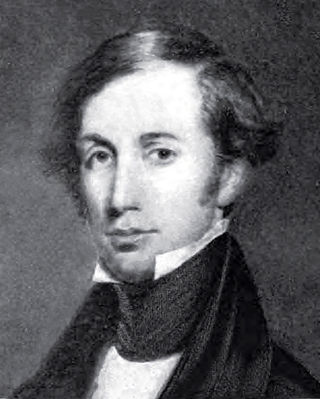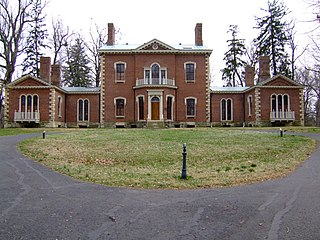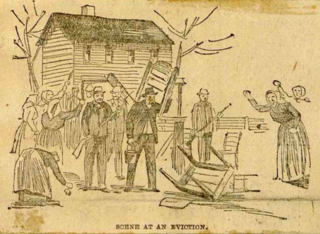
Henry Clay Sr. was an American attorney and statesman who represented Kentucky in both the U.S. Senate and House of Representatives. He was the seventh House speaker as well as the ninth secretary of state. He unsuccessfully ran for president in the 1824, 1832, and 1844 elections. He helped found both the National Republican Party and the Whig Party. For his role in defusing sectional crises, he earned the appellation of the "Great Compromiser" and was part of the "Great Triumvirate" of Congressmen, alongside fellow Whig Daniel Webster and John C. Calhoun.

Webster County is a county located in the U.S. state of Kentucky. As of the 2020 census, the population was 13,017. Its county seat is Dixon and its largest city is Providence. It is the southernmost county in the Evansville, IN–KY Metropolitan Statistical Area. The county was formed in 1860 from parts of Henderson, Hopkins, and Union Counties and named for American statesman Daniel Webster (1782-1852). It was mainly pro-Confederate during the American Civil War and was the site of several skirmishes and some guerrilla warfare. Since 2018 it has been a moist county, with Providence and Sebree voting to allow alcohol sales, and Clay doing so in 2022.

Perry County is a county in the U.S. state of Kentucky. As of the 2020 census, the population was 28,473. Its county seat is Hazard. The county was founded in 1820. Both the county and county seat are named for Commodore Oliver Hazard Perry, a naval hero in the War of 1812.

Breathitt County is a county in the eastern Appalachian portion of the U.S. state of Kentucky. As of the 2020 census, the population was 13,718. Its county seat is Jackson. The county was formed in 1839 and was named for John Breathitt, who was Governor of Kentucky from 1832 to 1834. Breathitt County was a prohibition or dry county, until a public vote in July 2016 that allowed alcohol sales.

John Jordan Crittenden was an American statesman and politician from the U.S. state of Kentucky. He represented the state in the U.S. House of Representatives and the U.S. Senate and twice served as United States Attorney General in the administrations of William Henry Harrison, John Tyler, and Millard Fillmore. He was also the 17th governor of Kentucky and served in the state legislature. Although frequently mentioned as a potential candidate for the U.S. presidency, he never consented to run for the office.

Henry Clay Jr. was an American politician and soldier from Kentucky, the third son of US Senator and Representative Henry Clay and Lucretia Hart Clay. He was elected to the Kentucky House of Representatives in 1835 and served one term. A graduate of West Point, he served in the Mexican–American War and was killed in 1847 at the Battle of Buena Vista.
Drift mining is either the mining of an ore deposit by underground methods, or the working of coal seams accessed by adits driven into the surface outcrop of the coal bed. A drift mine is an underground mine in which the entry or access is above water level and generally on the slope of a hill, driven horizontally into the ore seam. Random House dictionary says the origin of the term "drift mine" is an Americanism, circa 1885–1890.

Ashland is the name of the plantation of the 19th-century Kentucky statesman Henry Clay, located in Lexington, Kentucky, in the central Bluegrass region of the state. The buildings were built by enslaved African Americans, and enslaved people grew and harvested hemp, farmed livestock, and cooked and cleaned for the Clays.
Henry Clay High School is an American public high school in Lexington, Kentucky. Opened on Main Street in 1928, it was named in honor of the Kentuckian and United States statesman, Henry Clay. The Main Street location now houses the main offices of the Fayette County Public Schools system. The school was ranked in 2022 by U.S. News & World Report as #18 of schools in Kentucky and #1,705 nationally. The school's facility on Fontaine Road opened in 1970.

James Brown Clay was an American politician and diplomat who served as a member of the United States House of Representatives for Kentucky's 8th congressional district from 1857 to 1859.

Madeline (Madge) McDowell Breckinridge was an American leader of the women's suffrage movement in Kentucky. She married Desha Breckinridge, editor of the Lexington Herald, which advocated women's rights, and she lived to see the women of Kentucky vote for the first time in the presidential election of 1920. She also initiated progressive reforms for compulsory school attendance and child labor. She founded many civic organizations, notably the Kentucky Association for the Prevention and Treatment of Tuberculosis, an affliction from which she had personally suffered. She led efforts to implement model schools for children and adults, parks and recreation facilities, and manual training programs.
Henry Clay McDowell Jr. was a United States district judge of the United States District Court for the Western District of Virginia.

Knox County is a county located in Appalachia near the southeastern corner of the U.S. state of Kentucky. As of the 2020 census, the population was 30,193. Its county seat is Barbourville. The county is named for General Henry Knox. It is one of the few coal-producing counties in Kentucky that has not suffered massive population loss. Knox County is included in the London, KY Micropolitan Statistical Area.

The Morewood massacre was an armed labor-union conflict in Morewood, Pennsylvania, in Westmoreland County, west of the present-day borough Mount Pleasant in 1891.
Peabody was a post office in Clay County, Kentucky, United States that served coal mining and lumber company lands bought by Francis Peabody of Peabody Energy and eventually ended up as part of a national forest. It closed in 1982. The Red Bird Purchase Unit Ranger Station is located at Peabody.

The 1824 United States presidential election in Kentucky took place between October 26 and December 2, 1824, as part of the 1824 United States presidential election. Voters chose 14 representatives, or electors to the Electoral College, who voted for President and Vice President.

The 1832 United States presidential election in Kentucky took place between November 2 and December 5, 1832, as part of the 1832 United States presidential election. Voters chose 15 representatives, or electors to the Electoral College, who voted for President and Vice President.

The 1844 United States presidential election in Kentucky took place between November 1 and December 4, 1844, as part of the 1844 United States presidential election. Voters chose 12 representatives, or electors to the Electoral College, who voted for President and Vice President.

Henry Clay is a 1929 bronze sculpture by Charles Henry Niehaus depicting the lawyer and politician Henry Clay, installed in the United States Capitol in Washington D.C. as part of the National Statuary Hall Collection. It is one of two statues donated by the state of Kentucky. The statue was accepted into the collection by Virgil Chapman on March 3, 1929.
The geology of Kentucky formed beginning more than one billion years ago, in the Proterozoic eon of the Precambrian. The oldest igneous and metamorphic crystalline basement rock is part of the Grenville Province, a small continent that collided with the early North American continent. The beginning of the Paleozoic is poorly attested and the oldest rocks in Kentucky, outcropping at the surface, are from the Ordovician. Throughout the Paleozoic, shallow seas covered the area, depositing marine sedimentary rocks such as limestone, dolomite and shale, as well as large numbers of fossils. By the Mississippian and the Pennsylvanian, massive coal swamps formed and generated the two large coal fields and the oil and gas which have played an important role in the state's economy. With interludes of terrestrial conditions, shallow marine conditions persisted throughout the Mesozoic and well into the Cenozoic. Unlike neighboring states, Kentucky was not significantly impacted by the Pleistocene glaciations. The state has extensive natural resources, including coal, oil and gas, sand, clay, fluorspar, limestone, dolomite and gravel. Kentucky is unique as the first state to be fully geologically mapped.















